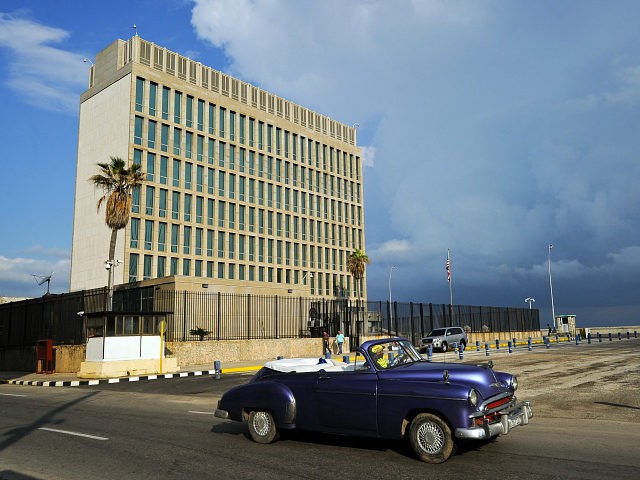The Assembly of Cuban Resistance, a coalition of nearly 50 anti-communist, pro-democracy groups, urged President Donald Trump in a letter published Tuesday to close the U.S. Embassy in Havana and its Cuban counterpart in Washington following a spate of sonic attacks that have left dozens of American diplomats with significant injuries.
“The United States embassy in Cuba should close without a doubt and the ‘diplomats’ of the Castro regime declared personae non gratae in the United States,” the letter read, arguing that the attacks on at least 21 American diplomats in Havana, which left some with severe hearing loss and brain damage, required “drastic measures against the Castro government.”
The letter begins by thanking President Trump for his administration’s firm stance against the Castro regime, a serial violator of human rights for nearly 60 years and a sponsor of terrorist groups like the Revolutionary Armed Forces of Colombia. It particularly notes President Trump’s condemnation of Cuba at the United Nations General Assembly where, “by signaling that the Castro regime is not only harmful to the Cuban people but to our hemisphere, you lent to Cuban patriots hope and inspire them to persist in their efforts to achieve liberty and democracy.”
“The alliance of the Castro regime with the world’s most dangerous regimes poses a permanent threat against the national security of the United States and the welfare of its citizens,” the letter continues. Urging a closure of the Cuban embassy in America and its counterpart in Havana, the letter notes that the embassies have “contributed to the increase in repression against dissidents and facilitated aggression against American officials in Cuba.”
“We see the United States as the most powerful bastion of democracy in the world, as a light of hope on this long path of effort to end the tyranny that has frustrated the liberties and rights of the Cuban people,” the letter concludes.
Calls to shut down the American embassy in Cuba have escalated since the U.S. State Department confirmed that dozens of American officials on the island have suffered health repercussions from what the government believes is the use of advanced acoustic instruments used to induce brain damage and concussion-like symptoms. In the United States, the most prominent voice calling for the embassy to close has been the editorial board of the Wall Street Journal, to which the Cuban exile community has also raised its voice calling for the undoing of Barack Obama’s policies to placate the Castro regime.
In a recent interview, Secretary of State Rex Tillerson confirmed that the department is considering shutting down the embassy. “We have it under evaluation. It’s a very serious issue with respect to the harm that certain individuals have suffered,” he told CBS’s Face the Nation.
Tillerson met with his Cuban counterpart Bruno Rodríguez on Monday and reportedly issued a “firm and frank” statement of concern to the nation’s top diplomat. According to the State Department, Tillerson “conveyed the gravity of the situation and underscored the Cuban authorities’ obligations to protect Embassy staff and their families under the Vienna Convention.”
.@statedeptspox: Sec Tillerson met yesterday w/ @CubaMINREX, expressed profound concern for safety & security of US diplomats in #Cuba. pic.twitter.com/ZtpBIgMvjq
— Department of State (@StateDept) September 27, 2017
The Cuban version of this meeting differs somewhat. In a statement on the Cuban Foreign Relations agency (Minrex) page, the regime states the meeting was requested by the Cubans and “occurred in a respectful climate.” The Castro regime highlights that Rodríguez “reiterated his condolences to Secretary Tillerson of the Cuban people and government over the damage caused by hurricanes Harvey and Irma in the United States.”
Minrex notes that Rodríguez used the meeting to urge Tillerson to let the Cuban government investigate itself on the matter of the injured diplomats. “The Minister asserted to Secretary Tillerson the importance of the U.S. government cooperating effectively with Cuban authorities to clarify some acts that do not have precedent in Cuba,” the statement read, adding that Rodríguez objected to the expulsion of two Cuban diplomats from the U.S. following the revelation of the sonic attacks.
The Cuban government has recently claimed it created an “inter-institutional committee of experts for the analysis of the events” that hurt the diplomats. Neither Cuba nor the United States has issued any statement concluding that they have found evidence implicating any suspects in the attacks, however.
According to the most recent news updates, sources within the U.S. government have raised the number of affected diplomats to at least 25 as of this week. Investigators believe, according to the unnamed sources feeding local Miami outlets, that some of these attacks occurred while the diplomats were in the U.S. Embassy itself. Washington’s official victim count remains at 21.

COMMENTS
Please let us know if you're having issues with commenting.